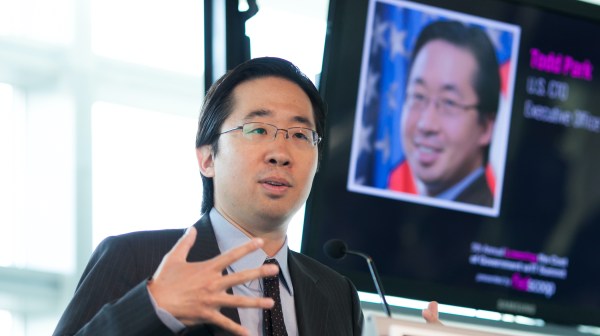Vint Cerf: U.S. needs to step away from ICANN oversight
Vint Cerf, widely regarded as one of the “fathers of the Internet,” said it’s time for the United States to relinquish oversight of the Internet Corporation for Assigned Names and Numbers, allowing a global multistakeholder group to take over management responsibilities.
Cerf spoke at a National Press Club event Monday where he discussed how to improve and mature the Internet as its global user base grows.
Currently the Commerce Department’s National Telecommunications and Information Administration controls the Internet Assigned Numbers Authority, a department of ICANN that manages IP addresses. But Cerf, a former ICANN board member, said NTIA should move forward with transitioning IANA to a coalition of global Internet technical entities after its contract with ICANN expires Sept. 30.
“I’m a strong believer that the government should step away from its responsibility or authority and return this to the community,” Cerf said.
Cerf, now the chief Internet evangelist at Google, said this transition helps further the underlying idea that all sectors of life are responsible for protecting the Internet.
“The private sector, civil society, the tech community, the academic community and government all have a responsibility to be part of the policymaking apparatus for the Internet,” Cerf said.
Later in the speech, Cerf mentioned his name came up as a candidate for U.S. chief technology officer — a job now held by former Google employee Megan Smith. But he said Google Executive Chairman Eric Schmidt gave him some advice: He’d make a better “best friend of the CTO.”
“I don’t feel the need to become a part of the government, but I will provide support and help, if I can,” said Cerf, who served as a Defense Advanced Research Projects Agency official from 1976 to 1982.
Cerf also addressed a number of measures people and companies need to take if the Internet is to harness the network’s growing number of connections. He challenged Internet service providers to fully embrace IPv6, a new Internet protocol that addresses the exhaustion of the IPv4, to make room for the Internet of Things.
“The next wave of stuff is IoT — this is real,” he said. “Every appliance that you can possibly imagine is shifting from electromechanical controls to programmable controls. Once you put a computer inside of anything, there is an opportunity to put in on the [Internet].”
He also called on users to better protect themselves, harnessing tools like encryption and two-factor authentication. But his main message was that any policy put in place needs to carve out space for new technologies to emerge.
“The thing I like most about the Internet is it’s evolvable, it’s scalable and it has invited creativity,” Cerf said. “We use the term ‘permissionless innovation’ very deliberately. You don’t have to get permissions from the ISPs in the world to put a new product or service on the Internet, and it should stay that way.”




